Creation Care

Editor’s Note: This post contains two of many testimonies given at an Environmental Protection Agency listening session at EPA headquarters in Washington, D.C. The EPA held sessions in 11 regional offices across the country to allow the public to comment on the agency’s plans to begin regulating carbon dioxide emissions — one of the heat-trapping pollutants that contributes to climate change — from existing coal and natural gas-fired power plants. The public was invited to share up to three minutes of spoken testimony to an EPA panel for the agency’s consideration.
My name is Dr. Jalonne L. White-Newsome and I am a federal policy analyst at WE ACT for Environmental Justice, a 25-year-old community based environmental justice organization based in Harlem, N.Y. However, I work out of our Washington, D.C. office, mostly engaging in federal policy. Although I am in a different location, WE ACT D.C. has the same mission: to build healthy communities by insuring all voices help shape environmental policy and practices so that they are fair.
As a public health researcher who has seen the impacts of temperature, air pollution, and climate changes on urban-dwelling seniors in low income communities of color, I am clear about the need for and the importance of the testimony that I, and hopefully other environmental justice organizations, will offer here today. While three minutes is not a lot of time, I do have a couple of "calls to action" to uplift as you continue your work:
- Recognize the deficiency.
- Recognize the cumulative impacts.
As President Obama has pointed out, the climate issue is not only a technical one. In his words, “We have a moral obligation to future generations to leave them a planet that is not polluted and damaged.” We in the faith community would, of course, agree. But it is not only future generations that will bear the impacts of climate change. They are being felt now, most intensely by those populations around the world who are least able to cope with them. We must act with great conviction and haste to move toward solutions.
The central principle of the Bahá'í Faith is the oneness of humankind. This principle has deep implications for policy in many arenas. It should guide us to seek solutions that are equitable and just, treating all people as members of one human family. I believe that to be effective, the carbon standards established by EPA over the next several months must be animated by this foundational principle.
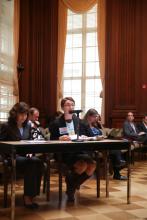
Editor’s Note: This post contains two of many testimonies given at an Environmental Protection Agency (EPA) listening session at EPA headquarters in Washington, D.C. The EPA held sessions in 11 regional offices across the country to allow the public to comment on the agency’s plans to begin regulating carbon dioxide emissions — one of the heat-trapping pollutants that contributes to climate change — from existing coal and natural gas-fired power plants. The public was invited to share up to three minutes of spoken testimony to an EPA panel for the agency’s consideration. We also have multiple other testimonies in parts two and three.
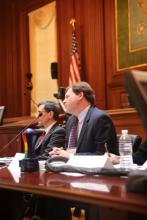
The Environmental Protection Agency held listening sessions Thursday to hear from the public about a forthcoming rule about carbon emissions from existing power plants. More than 20 faith leaders spoke on behalf of those Jesus called “the least of these.” In addition to such faith leaders as Rev. Dottie Yunger and Interfaith Power & Light’s Joelle Novey, other parties, from pro-coal Sen. Mitch McConnell, R-Ky., and coal lobbyist Mike Carey to the Sierra Club’s Leslie Fields and League of Conservation Voters’ Gene Karpinski, were on hand to testify. Those testifying had three minutes apiece to voice their views on what the new rule on emissions should look like.
Prior to the testimonies, more than 20 faith leaders assembled outside of the EPA to pray that God’s creation would be restored. Organized by Creation Justice Ministries and Greater Washington Interfaith Power and Light, the vigil featured songs of hallelujah and peace. Novey read a Jewish prayer for travelers, asking God to lead us into safety.
After the worship service, the faith leaders joined a diverse audience to testify to the EPA about the importance of battling climate change. I saw five faith leaders speak, reminding the agency that they not only have a technocratic responsibility to create a stringent rule limiting carbon emissions, but also a moral responsibility to do so.
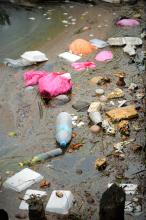
In the Hebrew and Christian scriptures, there is a Psalm that proclaims: “the earth is the Lord’s and everything in it, the world, and all who live in it” (Psalm 24:1). There is no part of this world that God is not aware of, cannot lay claim to, and does not rule. Christians affirm that as people of faith we’re called to be stewards over creation, answering one day for how we’ve treated the earth.
And part of that stewardship means understanding how this world works and what it needs in order to thrive. Unfortunately the din of our political ideologies has too often drowned out the biblical calling to care for creation.
In Texas, the State Board of Education will recommend new textbooks for all its students—and because it has such a large population, what they decide could determine what students in other states learn about science. There are several ideologues submitting textbook critiques to the board and their reviews will factor into each book’s overall score and likelihood of being approved by the school board. These ideologues could block the use of textbooks that teach the reality of climate change for the whole country’s public school students.
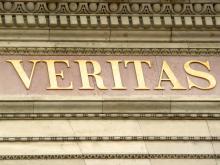
IF YOU WANT to understand why the climate movement missed Tim DeChristopher when he was in jail for two years, you should read the letter he sent recently to the president of Harvard.
Drew Faust—Harvard’s first female president—had just spoken for the establishment (really, the establishment establishment) by publishing a weary, soulless letter explaining that Harvard would not divest from fossil fuels despite the request of 80 percent of its student body. DeChristopher—who was imprisoned for two years after an inspired act of civil disobedience to block a drilling lease auction in his home state of Utah—had just arrived in Cambridge to start at Harvard Divinity School.
“Drew Faust seeks a position of neutrality in a struggle where the powerful only ask that people like her remain neutral,” DeChristopher wrote. “She says that Harvard’s endowment shouldn’t take a political position, and yet it invests in an industry that spends countless millions on corrupting our political system. In a world of corporate personhood, if she doesn’t want that money to be political, she should put it under her mattress. She has clearly forgotten the words of Paolo Freire: ‘Washing one’s hands of the conflict between the powerful and powerless means to side with the powerful, not to remain neutral.’ Or as Howard Zinn put [it] succinctly, ‘You can’t be neutral on a moving train.’”
DeChristopher is exactly right. Just as a tie goes to the runner, so “neutrality” goes to the status quo. And given that we’re in a full-on climate emergency—the Arctic melted last summer, for crying out loud—this kind of neutrality is no more admirable than defending the right of poor and rich alike to sleep beneath bridges.

With her gray hair tied neatly in a bun and her wire-rimmed glasses perched thoughtfully on her nose, Ellen Davis looks the part of a distinguished Bible scholar.
Her resume certainly reads like one – a Ph.D. from Yale University and teaching appointments at Union Theological Seminary, Virginia Theological Seminary, Yale, and now Duke Divinity School.
Yet despite the traditional cast, Davis is leading a quiet revolution. For the past 20 years, she has been at the vanguard of theologians studying the biblical understanding of care for the land.
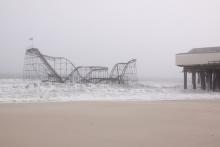
This week marks the one-year anniversary of Hurricane Sandy, the superstorm that decimated metropolitan areas of the East Coast last fall.
Damage from the storm resulted in more than 100 fatalities, with an estimated loss of $65 billion. Thousands of homes were lost, and millions were without power for days. Thousands of flights were canceled along the eastern seaboard, and multiple public transit services were suspended, including Amtrak and New York City’s bus and subway system. Even the U.S. economic structure ground to a halt, with NASDAQ and the New York Stock Exchange closing to buckle down before the deluge.
One year later, we reflect on reconstruction efforts post-Sandy. We also pause to assess the role of climate change, exacerbated by human actions, in the creation and severity of the storm.
Unprecedented levels of air pollution effectively closed the city of Harbin in northern China earlier this week. Smog limited visibility in some places up to 30 feet, and measurements of fine particulate pollution skyrocketed a record 40 times higher than the worse safe level set by the World Health Organization, according to the Washington Post.
In the city of 11 million, schools, public bus routes, and the airport were all forced to suspend activities given the unsafe conditions. Hospital admittances of patients with respiratory problems soared an additional 30 percent.
The cause, according to local Chinese news outlets, was the first day of the city’s heating being turned on before winter. China’s air quality has consistently been found to be harmful in the recent decades of the country’s rapid industrial development.
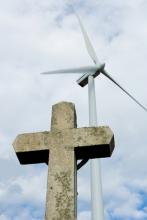
There’s a debate happening on The Christian Post, and we’re hearing more and more evangelical voices expressing concern over climate change.
Over the summer, talk radio pundit Rush Limbaugh made a comment about people believing in God and manmade global warming: he said it was “intellectually impossible.” It is not, of course, impossible to have faith in God and to agree with 97 percent of scientists that we are harming God’s creation with climate change. And in response to Rush’s comments, Sojourners sent Mr. Limbaugh a letter signed by more than 9,000 people of faith asking him to correct the record (which he has not yet done).
But Rush Limbaugh’s comments also sparked a conversation on the popular evangelical website, The Christian Post. Two prominent climate scientists who are also evangelical Christians, Dr. Katharine Hayhoe and Dr. Tom Ackerman, responded to Rush in an open letter on site. They told Rush that, contrary to his assumptions, they are compelled to work in their field by both their faith in God and their expertise in atmospheric science.
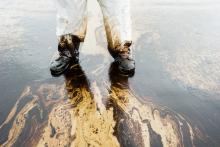
Occurrences of oil spills in several states have garnered little media attention in the last few years. In some cases, prompt reports are recorded, yet in others, days have gone by before the authorities are alerted and the spill becomes public knowledge.
The most recent episode happened Oct. 15, in Port of Long Beach, Calif. Upon discovery of an oil leak, Exxon Mobil announced that it was temporarily suspending operations of its pipeline system. The pipeline, which connects to the company’s refinery in Torrance, carries up to 155,000 barrels of oil per day. Exxon filed documents with the California Emergency Management Agency that claimed the leak did not affect waterways, although the company was ordered to pay a $236 million fine for contaminating groundwater in New Hampshire this past April.
Another spill was initially discovered on Sept. 29 by North Dakota farmer Steve Jensen, the Associated Press reported. While harvesting wheat, Jensen discovered the leak in his field “spewing and bubbling 6 inches high.” The rupture was a break in Tesoro Corporation’s underground pipeline. While it remains unconfirmed, early evidence cites that corrosion on the 20-year-old pipeline is the cause of rupture. At least 20,600 barrels of oil flooded the 7-acre spill zone, equal to about 7 football fields.
The delay in making public North Dakota’s oil spill proves as worrisome as the spill itself. It took 11 days after the spill’s discovery for it to become public knowledge. Officials claim they were not aware how extensive the spill was, but critics point to the state’s financial benefits in the recent gas and oil boom as reason for the authorities’ hesitancy in coming down on oil companies. But economic incentives shouldn’t diminish the serious need to weigh environmental risks and costs.
The cases begin to pile up.
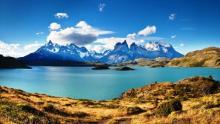
Is access to clean water for public use a human right? According to Luis Infanti, the Roman Catholic bishop of Aysen in Chile, the answer is yes. This week marks the opening of Chile’s “First Cabildo for Water,” a meeting organized by the Coalition for the Defense of Water and Life, comprising civil society and religious groups.
People from all over Chile are attending and bringing water samples taken from lakes, streams, and rivers in their communities to be blessed by Bishop Infanti. “Water has often been captured, kidnapped and commodified,” said Infanti, according to Agenzia Fides, “but we know that it must give life and reach all our brothers and sisters, flow in abundance and not be anyone’s privilege.”
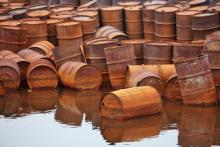
During the government shutdown, some cuts have caught the public’s attention more than others. And some people are rejoicing over the cuts faced by the Environmental Protection Agency and other environmental agencies. But the shutdown of our environmental programs is affecting people’s lives in ways that might surprise you.
1. National Parks closures are more than an inconvenience
In some National Parks across the country, employees are stranded. Employees who live on park grounds, like park rangers and concession workers, have no work or pay, and because the parks are closed, they’re not even allowed to take solace in the trails that surround them. And in at least one case, they don’t have any food. About 2,200 employees – 1,800 of them concession workers – are stranded in Grand Canyon National Park. A local food bank has started making deliveries, because those people are going hungry and without pay.

At an interfaith summer camp in northern New Jersey, two dozen children explored a swamp to learn how creatures depend on safe water.
In Southern California, a Unitarian Universalist congregation installed a dry well so water from its church rooftops drains into underground pipes to replenish the water table.
In Vermont, members of a Lutheran church removed cars and appliances that had been dumped in a nearby stream and restored its banks with local willows and oaks.
Across the country, water has become more than a ritual element used in Christian baptismal rites or in Jewish and Muslim cleansing ceremonies. It has become a focus for worshippers seeking to go beyond water’s ritual symbolism and think more deeply about their relationship to this life-giving resource.
OFFICER MARIO normally worked for Homeland Security. On this Friday night he’d been seconded to the Washington, D.C. Metro police, who had their hands full. Not only did they have the usual “drunk and disorderlies,” but now 54 people who looked like card-carrying members of the AARP were filling up their holding cells. Officer Mario, of retirement age himself, was feeling fortunate. He’d been assigned to the women’s side.
“Ladies, ladies, ladies!” Mario said, sauntering in with a mischievous smile. “This must be my lucky night.”
The evening before, we’d all been at St. Stephen and the Incarnation Episcopal Church running role plays on how to “flash mob” the corporate headquarters of Environmental Resources Management (ERM), the firm hired by the U.S. State Department to provide an environmental impact statement on the Keystone XL pipeline. To the disbelief and concern of climate scientists, ERM claimed that TransCanada’s Keystone pipeline would not significantly contribute to climate change. ERM was suspected of “misleading disclosures” regarding conflict of interest and material gain from the pipeline’s completion.
Our white-haired mob of mostly grandparents converged on ERM headquarters at noon to shine a light on such shady dealings. While six silver foxes blocked the elevators by chaining their arms together inside a PVC pipe, I watched two D.C. police lift Steve, age 70, and toss him into the crowd behind me. I knew this nonviolent civil disobedience wasn’t going as planned.

Texas high school biology textbooks battles are once again in progress in Austin, with lines drawn between those who want textbook material based only on established mainstream science and those who are anti-science. As an evangelical Christian and a botany professor at Hardin-Simmons University in Abilene, Texas, I am all too familiar with the battle for scientific authenticity in our state’s textbooks.
The Texas State Board of Education (SBOE) wields an enormous influence over which textbooks are adopted by school districts in Texas. And because the Texas market for public school textbooks is one of the country’s largest, publishers use the curriculum and content from Texas books in those they print for the rest of the nation. For this reason, what happens in Texas doesn’t stay in Texas. This is why it is so important that we ensure that publishers produce books based on mainstream science.

I just completed my first Climate Ride, journeying 300 miles by bicycle over five days with 200 other climate activists. Climate Ride began five years ago, and the riders raise money for organizations that work on sustainability and climate change. They’re also a way to spread the word about the growing and increasingly determined climate movement. For those of us who take part – by now, thousands of us have – the rides have a deep and lasting impact.
These are my reflections from the last day of the ride; you can read reflections on the first four days of the Climate Ride here.
THE ANACOSTIA RIVER is a river of contrasts. Often called “the nation’s forgotten river,” it flows for eight-and-a-half miles through some of the richest and poorest communities in and around D.C., through residential and industrial zones, through marshes and military installations. In fact, the federal government owns so much land in the watershed that when all those federal toilets flush during a heavy rain, they drain directly into the river.
The Anacostia River watershed is home to more than 800,000 people, 43 species of fish, and nearly 200 species of birds—including our nation’s symbol, the bald eagle, and the majestic great blue heron. Yet the trash in the river is so deep and wide at times that you’re just as likely to see a heron walking across a flotilla of trash rather than flying over the water.
As the Anacostia Riverkeeper—part of the Waterkeeper Alliance movement to protect local waterways—it was my job for three years to be the eyes, ears, and voice of its watershed. Of the nearly 200 waterkeepers worldwide, I was the only riverkeeper who was also a minister. I was called “Rev. Riverkeeper.”
The antiquated sewer system that pumps more than 2 billion gallons of raw sewage, mixed with polluted runoff, into the river each year is not just a shame, it’s a sin. African-American churches along the Anacostia used to baptize their members in the river. Nowadays, the river wouldn’t wash away anyone’s sins. My goal as Rev. Riverkeeper was an Anacostia that was not only “fishable” and “swimmable”—as required by the Clean Water Act—but also “baptizable.”